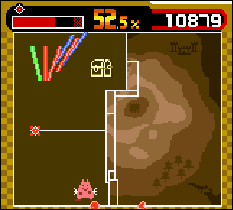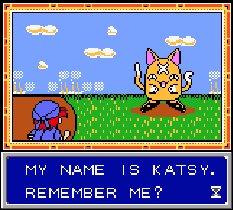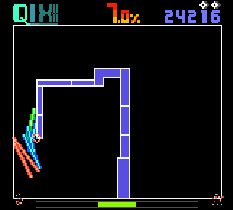 The Game: A boy named Speedy ventures through a mystical land, taunted by cute animals. Somehow this quest is expressed through a series of challenges in which the player tries to claim as much of the playing field as possible by enclosing areas of it. If the ever-shifting Qix touches Speedy’s marker or an uncompleted boundary, a life is lost and the boundary must be built again. Sparx, which travel only along the edges of the playing field and along the boundaries of already-enclosed areas of the screen, can also cost Speedy a life. (Taito, 2000)
The Game: A boy named Speedy ventures through a mystical land, taunted by cute animals. Somehow this quest is expressed through a series of challenges in which the player tries to claim as much of the playing field as possible by enclosing areas of it. If the ever-shifting Qix touches Speedy’s marker or an uncompleted boundary, a life is lost and the boundary must be built again. Sparx, which travel only along the edges of the playing field and along the boundaries of already-enclosed areas of the screen, can also cost Speedy a life. (Taito, 2000)
Memories: In 2000, two trends collided within this one game. Trend #1 was the fading glow of a few years’ worth of retro video gaming nostalgia, a trend that brought of lots of arcade compilations and lots of “remakes” of classic arcade games, especially on the then-ubiquitous Playstation. Trend #2 was simple and obvious: jumping on the Pokemon bandwagon.
 I’ve been known to rant a bit about the evolution of Qix from simple, abstract elegance to a game that just simply didn’t need a cute, animated dragon or manga-inspired background graphics that could be uncovered. And yet that’s precisely what Qix became. Even when it had evolved to the point that it simply wasn’t Qix anymore, and someone finally had the sense to change the name, the Playstation version was localized in the U.S. as Qix Neo. You just can’t win.
I’ve been known to rant a bit about the evolution of Qix from simple, abstract elegance to a game that just simply didn’t need a cute, animated dragon or manga-inspired background graphics that could be uncovered. And yet that’s precisely what Qix became. Even when it had evolved to the point that it simply wasn’t Qix anymore, and someone finally had the sense to change the name, the Playstation version was localized in the U.S. as Qix Neo. You just can’t win.
The game play, if one can ignore the goofy, plodding, Pokemon-ified cutscenes, is very much simplified Qix, except that now whatever cartoon creature was just harrassing you is on the board alongside the familiar swirling line monster. Trapping it within a filled area eliminates it. Perhaps to dial things back so a young, Pokemon-hungry audience would  latch onto it, Taito severely reduced the difficulty level of Qix. The first time I picked the game up, I got to level six before losing a single life.
latch onto it, Taito severely reduced the difficulty level of Qix. The first time I picked the game up, I got to level six before losing a single life.
Luckily, you don’t have to put up with the cartoon silliness; there’s a “classic” Qix mode in Qix Adventure, which replicates – to some degree – the original arcade game. But it’s just not the same – in fact, the original B&W Game Boy Qix was better.
Leaching the stark, simple beauty of the original coin-op Qix is one thing, but actually making the game less fun is another.  Longtime arcade dwellers looking to fit Qix in the palm of their hands would do better to look elsewhere for their Qix fix.
Longtime arcade dwellers looking to fit Qix in the palm of their hands would do better to look elsewhere for their Qix fix.